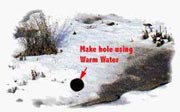|
|

Preparing For Winter
As the winter months approach the water temperature
in your pond begins to fall, as does the fishes metabolism. From
now on the fish will be entering a state of semi-hibernation.
It is very important that during this period, undigested food
does not linger in the body. Once the water temperature drops
below 50 degrees do not continue to feed your fish with a high
protein food. You should now consider feeding them good quality
wheatgerm-based food until winter is upon you in earnest. At
this point, no further food, what so ever, should be offered
to the Koi until the following season.
Don't worry, your fish will not come to any harm, they will live
on natural food from with in the pond.
If/when the pond freezes over you
should make a hole in the ice using warm water. This will allow
oxygen to enter, and any build up of toxic gases such as carbon
dioxide to be released into the open air.
Do not physically break
the ice as this creates potentially fatal shock waves for the
fishes beneath the ice, which could result in death. |
 |
As winter approaches it is essential that your
pond system is in the best condition possible. You should take
this opportunity to carry out basic cleaning and tidying up procedures
in and around your pond area. By doing this you not only ensure
your fish are in the best possible environment for the coming
months, but it will also give things a useful kick start for
the following spring.
It is very important you carry out these basic cleaning operations
before the environment become dormant.
If you choose to switch off pumps and shut down filtration systems
for the winter, you should fully drain, clean and store in a
dry place. Pumps that are left in the pond should be lowered
to such a depth so as not to be frozen solid in any ice that
may occur. The pump should be run from time to time to keep the
bearings free.
If you choose to run your system throughout the winter, (Depends
on the weather in your area), you should raise the pump nearer
to the surface and closer to the water inlet of the pond. Reduce
the turnover of the pump so that the water is just passing through
the filter slowly. This will keep things ticking over nicely.
Do not allow the pump to be encased and frozen in ice.
A hardy winter is not all bad news, it can have a beneficial
side to it. Parasites that the fish may be carrying will be reduced,
in turn preventing infestation the following season.
During these colder months, fish will tend to seek
shelter at the bottom of the pond where the water is warmer.
If at some stages on bright days through the winter months you
see the Koi hovering close to the surface, do not be tempted
to feed them, as their digestive system is still operating
at a reduced rate.
 |
Winter
Preparation
For Your Plants |
 |
Once plants start to die back, you need to remove
dead foliage. Take care with any plants that have hollow stems.
If you cut them back to far and allow water to enter they have
a tendency to rot away.
Any plants that are required to be over wintered in warmer condition
should be removed from the pond before the first frost, or the
chances are they will die.
Water lilies should be cut back as close to the base as possible,
do not let leave old foliage to decay and rot, as this will cause
toxic gases to be released, leaving your fish gasping for breath.
They can now be lowered to deeper water where they will be safe
from any frost.
Do not forget to raise them to a suitable flowering depth
in early April the following year.
This is also a good time to replenish the old soil with new soil.
If you can lay your hands on soil from mole hills, all the better,
as moles are only interested in finding worms, so will only dig
in soil rich in humus as this attracts worms. This is why soil
from mole hills make a good medium for growing waterlilies.
 |
A good idea is to cover your pond
with a net, this will not only prevent falling leaves and other
winter debris from entering the pond, eventually rotting and
releasing toxic gases. It also prevents HERONS and other predators
from preying on your much loved Koi. |
|
|




